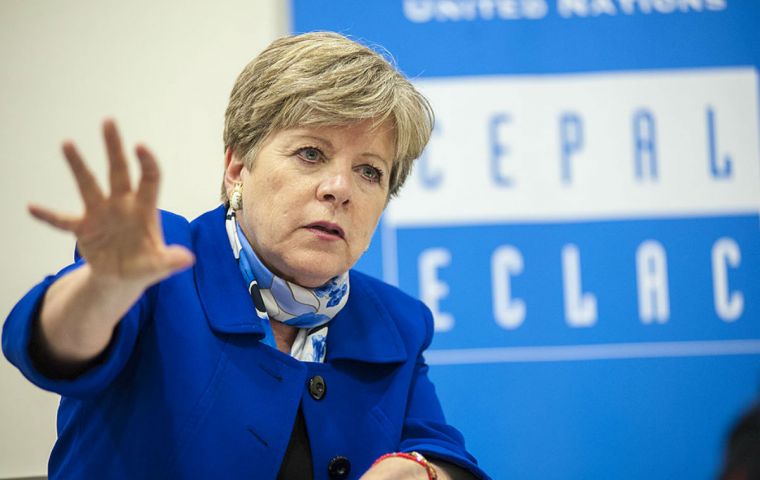MercoPress. South Atlantic News Agency
Latin America and Caribbean expected to grow 5.9% in 2021, ECLAC says
 “Countries need to complement domestic resources with greater access to international liquidity,” Bárcena said
“Countries need to complement domestic resources with greater access to international liquidity,” Bárcena said A new “Economic Study of Latin America and the Caribbean” report released Tuesday by the Economic Commission for Latin America and the Caribbean (ECLAC) raised its growth forecast for the region from 5.2% in July to 5.9%.
Despite the encouraging improvement, these figures remain below par to bounce back from 2019's Gross Domestic Product (GDP).
The countries that will grow the most this year are Panama (12%), Peru (10.6%), Chile (9.2%), Dominican Republic (8%), Argentina, El Salvador and Colombia (7.5%) and Mexico (6.2%), the report showed.
Behind came Brazil (5.2%), Bolivia (5.1%), Honduras (5%), Guatemala (4.6%), the Caribbean islands, Uruguay and Paraguay (4.1%).
Those with the poorest performances were reported to be Costa Rica (3.7%), Ecuador (3%), Nicaragua (2.5%), Cuba (2.2%), Haiti (-1.3%) and Venezuela (-4%).
The growth in 2021, according to the study, is mainly explained by a low comparison base -after the historic contraction of 6.8% in 2020-, in addition to the positive effects derived from external demand and the rise in the prices of raw materials, as well as increases in aggregate demand.
With 43.2 million infected and 1.4 million dead, Latin America is the region of the world most affected by the COVID-19 pandemic in health and economic terms, while Brazil, Mexico and Peru are among the five most affected countries in the world.
According to ECLAC the main challenge for the region is to maintain sustainable and inclusive growth, although “nothing allows us to anticipate that the dynamics of low growth before the crisis will change,” the report warned.
The structural problems that limited the region's growth before the pandemic, such as low investment and productivity, informality, unemployment, inequality and poverty, “have worsened and will negatively affect economic activity and labour markets,” the commission pointed out.
The pandemic unleashed the biggest crisis that regional labour markets have experienced since 1950 and the recovery expected for 2021, according to ECLAC, will not allow reaching pre-crisis levels either. The unemployment rate will reach 11% this year, compared to 10.5% in 2020.
The report also indicates that fiscal balances will improve but notes public debt levels will continue to be high, mainly due to aid packages to strengthen public health systems, support family incomes, and finance a healthcare structure, which represented 4.6% of GDP.
ECLAC Secretary-General Alicia Bárcena highlighted the asymmetries “between developed countries and middle-income nations - most of the countries in the region - both in the dynamics of vaccination and in the ability to implement policies for economic recovery.”
Bárcena made those remarks as she was announcing the release of the new report in Santiago, Chile.
The document also showed that regarding vaccination, 24.5% of the world population has a complete scheme. The European Union has 55.6% of its population immunized; the United States and Canada 53%; Latin America and the Caribbean 24.8%; South America 26.8%; Central America and Mexico 22.4%; The Caribbean 5.8%.
Regarding fiscal aid efforts, the United States had multi-year packages of around 18% of GDP; the EU issued bonds for 20 billion euros to finance public investment. In addition to that, Australia and Canada have new multi-year packages of around 5% of GDP in their 2021 budgets, while in Latin America, the new fiscal plans announced between January and June 2021 represent 2.2% of GDP.
Bárcena insisted that in the region “to maintain expansive fiscal and monetary policies, countries need to complement domestic resources with greater access to international liquidity and with multilateral mechanisms that facilitate debt management.”
She also advocated for multilateral initiatives to address uncertainties about vaccination and developing countries' access to financing under adequate conditions.
The document shows that the region's structural problems worsened as a result of the pandemic and will limit the recovery of economic activity.
Before Covid-19, the region had a trajectory towards stagnation: in the six-year period between 2014 and 2019, it grew at an average rate of 0.3%, lower than the average for the six-year period that includes the First World War (0.9%) and the Great Depression (1.3%).
In addition, the report shows a progressive fall in investment, which in 2020 hit one of its lowest levels in the last three decades (17.9% of GDP). Similarly, labour productivity falls significantly.
The study reinforces the need to channel investment towards sectors that promote a new style of development and that can enhance competitiveness, employment, and lower the environmental footprint.
In fiscal matters, the report highlights that public investment should be accelerated and private investment should be encouraged and attracted.
As a priority, countries need to focus on tax revenues and reducing evasion, which represents around 325,000 million dollars (6.1% of regional GDP).
The report also calls for greater access to international liquidity and mentions the recent issuance of Special Drawing Rights (SDRs) by the International Monetary Fund worth 650 billion dollars, but warned it was not a panacea and should be accompanied by other initiatives, including the creation of multilateral funds such as the Fund to Alleviate the Covid-19 Economy promoted by Costa Rica, to facilitate access to financing.
The study also highlights the need to strengthen regional, subregional and national development banks, as well as the establishment of a multilateral mechanism for restructuring sovereign debt to meet the obligations contracted with private creditors.
The ECLAC document also favoured the creation of a multilateral credit rating agency.




Top Comments
Disclaimer & comment rulesCommenting for this story is now closed.
If you have a Facebook account, become a fan and comment on our Facebook Page!